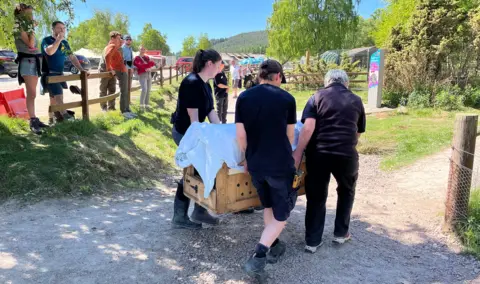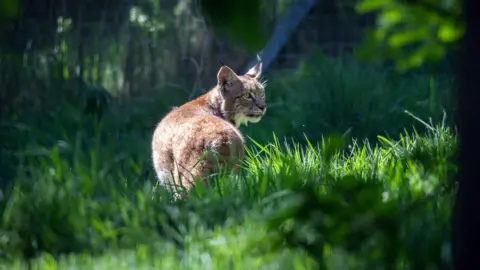Illegal release lynx arrive at their new permanent home
Three lynx that were illegally released in the Highlands earlier this year have moved to a new permanent home just a few miles from where they were found.
The wild cats were spotted in the Cairngorms National Park in early January, sparking a search before they were captured south of Aviemore.
After a period in quarantine at Edinburgh Zoo, the three female lynx have now moved to an enclosure at the Highland Wildlife Park in Kingussie, which is also run by the Royal Zoological Society of Scotland.
A fourth lynx, a male, was also captured in January but died a short time later.
The felines, all thought to be around one-year-old when they were released, are currently named A, B and C.
The names are the same as the first three animals the Royal Zoological Society of Scotland (RZSS) had in 1913 - a trio of penguins.
RZSS chief executive David Field said: "The lynx were clearly habituated to humans and would most likely have died if they hadn't been rescued as they would not have been able to find food for themselves.
"Caring for these cats at Highland Wildlife Park will help raise awareness of this incredible species and support discussions about how to reintroduce wildlife in Scotland responsibly.
"All three lynx have curious personalities, they love playing together, especially with balls and other toys. We are sure they will be a big hit with everyone who comes to see them."

The outside enclosure includes long grass, trees and furniture for climbing and scratching posts. There is also an area with beds they can retreat to if they need some peace and quiet.
Lauren Walker, an animal keeper at the wildlife park, told BBC Radio Scotland: "The enclosure is as close to the wild you can get with it still being safe for them.
"They'll be well looked after here."
Police were first alerted to reports of lynx on the loose in the Drumguish area of the UK's biggest national park on 8 January.
The Royal Zoological Society of Scotland used cage-type traps baited with venison and quail - a small game bird - to capture the cats. They were caught within two days.
Police Scotland has been investigating the January release. A force spokeswoman said: "Inquiries are continuing into this matter."

Lynx were once a native species in Scotland, but they died out several hundred years ago.
There are suspicions the Cairngorms lynx were abandoned pets, or were let go by people who want to see the animals reinstated to wooded hills and glens.
The conservation group Lynx to Scotland support a formal, legal reintegration of the wild cats but they condemned the January release.
'Irresponsible' abandonment
Steve Micklewright, chief executive of rewilding charity Trees for Life which is one of three charities that make up the Lynx to Scotland partnership, condemned the way the animals were released.
He said: "That abandonment was illegal and irresponsible - the lynx could've died, it was terrible.
"However, we believe lynx are needed in the wild.
"We know that UK is one of the only countries in Europe without a predator like lynx.
"Predators are a part of nature and create a natural balance to keep the number of other animals like deer in check, and limit the impact on other species.
"They are important for regeneration across our ecosystem system."
Lynx to Scotland has been working with farmers, landowners, tourism operators and conservationists and plan to publish a report next week.
It believes this will "provide the most detailed analysis yet of what a lynx reintroduction project in Scotland would need to do to ensure lynx and people could coexist".
Earlier this year, First Minister John Swinney ruled out a legal reintroduction of lynx.
